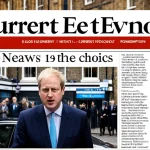Latest Brexit Developments and Government Actions
Recent Brexit news updates reveal a series of significant decisions by the UK government and the EU aimed at refining post-Brexit relations. The UK government Brexit policy has emphasized strengthening trade sovereignty while balancing economic stability. For example, recent Brexit decisions include adjustments to customs procedures designed to reduce delays at borders, reflecting the government’s initiative to minimize disruption for businesses.
In parallel, key government announcements focus on enhancing regulatory divergence to allow the UK to tailor its rules independently, a strategic shift advocated in several political statements. These moves are aligned with the UK government Brexit policy goal of increasing national control over laws and trade.
This might interest you : How Can the UK’s Current News Landscape Influence Future Policy Decisions?
On the EU side, negotiations have continued regarding the Northern Ireland Protocol, which remains a focal point in Brexit news updates. Both sides have made attempts to clarify implementation details, aiming for smoother cross-border cooperation.
Notably, political discourse has seen shifts as certain UK ministers push for more assertive stances on sovereignty, affecting recent Brexit decisions. These evolving positions signal dynamic changes in both policy and strategy, continually shaping the landscape of post-Brexit governance. Such developments are integral to understanding the ongoing impact of Brexit on the UK’s political and diplomatic frameworks.
Also read : How Could Recent Changes in UK Policies Impact Your Daily Life?
Economic Impacts of Recent Brexit Changes
Recent Brexit changes have exerted significant influence on the Brexit economy, particularly affecting UK trade impact and financial consequences. The evolution of trade agreements, including tariff adjustments, has reshaped market access for British businesses. These modifications have introduced new complexities, especially for industries reliant on seamless cross-border transactions.
Recent Brexit decisions surrounding customs and regulatory frameworks directly influence economic growth trajectories. For example, altered supply chain logistics have increased costs and delivery times for some sectors, causing ripple effects on investment confidence. The UK government Brexit policy aims to mitigate these drawbacks by pursuing trade deals beyond the EU, although the full economic benefits remain subject to ongoing evaluation.
Economic forecasts present mixed outlooks; some analyses highlight slower growth rates compared to pre-Brexit projections, partly due to uncertainty and changed trading conditions. Quantitative assessments reveal that while certain industries adjust quickly, others face prolonged challenges navigating the post-Brexit landscape. Statistical analysis also underscores the importance of diplomatic negotiations to stabilize trade relations and foster investor trust.
Overall, the Brexit economy continues to evolve under the weight of new policies and external factors. Understanding the interplay of government actions and market reactions is critical to anticipating future UK trade impact and financial consequences.
Social and Legal Implications Post-Brexit
Recent Brexit immigration updates highlight tighter controls on the movement of people, affecting both EU and non-EU nationals. The UK government Brexit policy has introduced a points-based immigration system, emphasizing skills and job offers, which marks a significant shift from previous free-movement arrangements. This system aims to balance labor market needs with tighter border security.
In terms of UK legal changes, recent Brexit decisions have led to the gradual repeal or amendment of EU-derived laws, allowing Parliament greater legislative freedom. These changes impact areas such as environmental standards, employment laws, and data protection. The government is pursuing regulatory divergence to better tailor laws to national priorities, though this raises concerns about potential legal uncertainty during the transition.
The post-Brexit society is adjusting to these legal and social shifts. Public sentiment shows mixed reactions: some citizens welcome increased control over immigration and sovereignty, while others express concerns over social cohesion and economic opportunities. These societal trends reflect broader debates on identity and inclusion since Brexit.
Together, the evolving immigration policies and legal frameworks under the UK government Brexit policy shape the complex social landscape, with ongoing effects on communities and institutions across the country.
Expert Opinions and Public Sentiment
Recent Brexit expert analysis commonly reflects nuanced views on the ongoing impact of Brexit. Economists often highlight the mixed effects on the Brexit economy, noting challenges in trade while acknowledging new opportunities outside the EU framework. Policy experts emphasize the importance of adaptive government measures to address emerging issues in customs and regulatory alignment.
Polling data indicates varied public opinion on Brexit outcomes. Surveys reveal that a substantial portion of the population remains divided on economic and social benefits. While some respondents express optimism about regained sovereignty, others cite concerns over trade disruptions and immigration policies. This split in sentiment underscores the complexity of public engagement with Brexit’s evolving realities.
Commentary from business leaders frequently focuses on adjusting to altered trade conditions. Many stress the need for clarity in government strategy to reduce uncertainty impacting investment decisions. Advocacy groups often call for balancing economic priorities with social cohesion, reflecting broader societal debates highlighted in post-Brexit discourse.
Together, this Brexit commentary reveals a landscape marked by cautious evaluation. Expert insights and public feedback provide vital perspectives for shaping future policy directions amid continuing adjustment to post-Brexit challenges.


